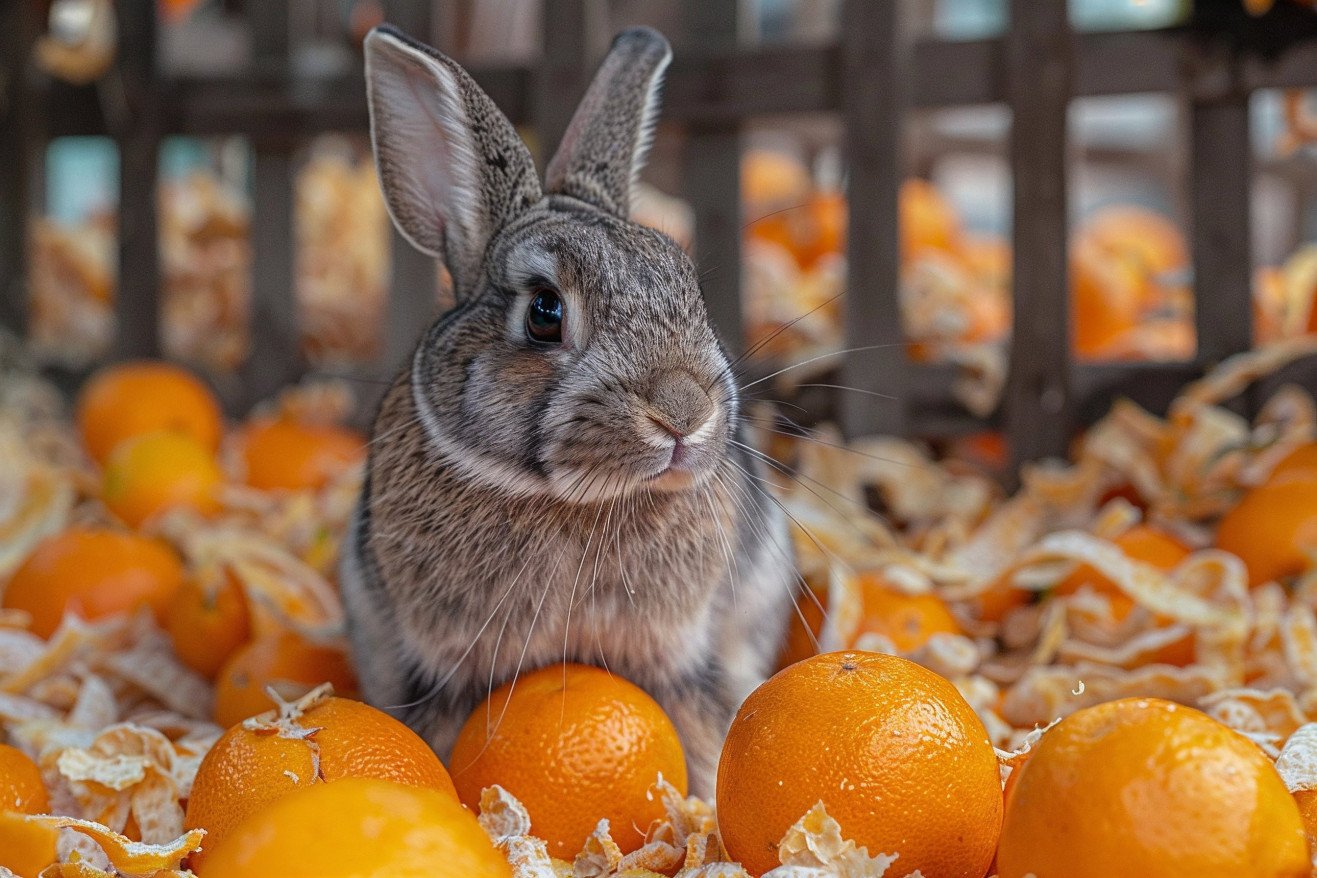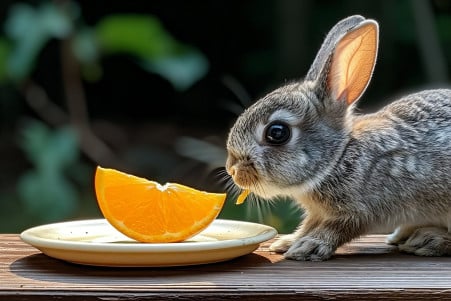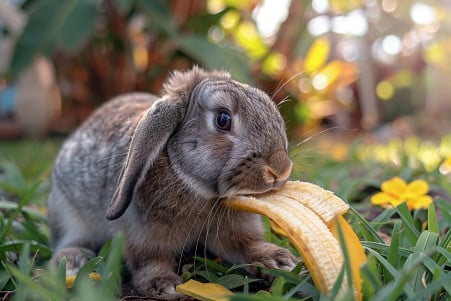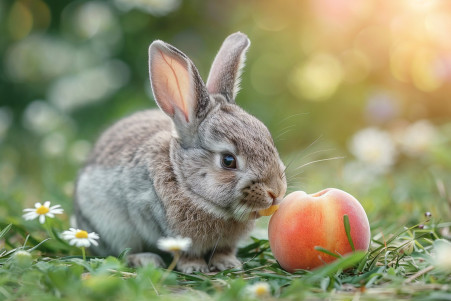Can Rabbits Eat Orange Peels? A Vet Weighs In on Citrus Treats
5 May 2024 • Updated 4 May 2024

Rabbits are known to have a sweet tooth, but can you give them the peels as a healthy treat? Orange peels are not good for rabbits because they contain compounds such as essential oils and limonene that can cause digestive upset. Instead, you should only give your rabbit the flesh of the orange in moderation or choose other fruits and vegetables to give them.
This article will cover the most recent clinical research and expert opinions on rabbits' nutritional requirements and the potential dangers of citrus peels and rinds. By the end, you will know what to look for when making decisions about your rabbit's diet, so you can make sure you're feeding them a healthy, well-rounded diet that will help them thrive.
Can rabbits eat orange peels?
Potential Dangers of Feeding Rabbits Citrus Peels
Citrus fruits, including oranges, lemons, and limes, contain compounds that can be harmful to rabbits when consumed in large amounts. The essential oils and limonene in citrus peels can cause irritation to a rabbit's delicate digestive system, potentially leading to gastrointestinal problems such as gas, bloating, pain, and an imbalance in the sensitive cecal microflora.
Citrus peels can also harbor pesticide residues and other chemicals from the fruit's cultivation and processing, which can be poisonous to rabbits. Although some rabbits may tolerate small amounts of the fruit's pulp, it's best to avoid feeding them the peels and rinds to reduce the risk of potential health problems like gastrointestinal stasis, bloating, pain, and loss of appetite.
It's important to talk to a vet before adding any new foods to your rabbit's diet, especially those that have known risks like citrus peels. Every rabbit has different nutritional requirements, and they need individualized care to make sure they stay healthy and happy.
What Do Rabbits Eat? Nutritional Requirements and a Balanced Diet
Rabbits are herbivores with specific nutritional requirements that are essential for their overall health and proper digestion. The RSPCA states that a rabbit's diet should be made up mainly of good-quality hay or grass, which is the most important source of fiber for healthy digestion and dental wear.
The Protexin Vet explains that grass or hay should make up approximately 85% of a rabbit's diet, as it is the most natural and most important part of their diet. In addition, fresh leafy greens and vegetables should be fed daily to ensure that rabbits get a range of nutrients and to keep their diet interesting.
While commercial rabbit pellets can be part of a rabbit's diet, Merck Veterinary Manual warns that rabbits should not be fed a diet that is primarily made up of pellets because it can lead to health problems. Fresh water should be available at all times, and Companion Animals explains that treats, such as fruit, should be fed sparingly because they are high in sugar.
With a diet that includes plenty of good-quality hay or grass, fresh greens, and a small amount of pellets, rabbit owners can make sure that their pets get the nutrition they need to stay healthy and digest their food properly.
How to Add New Foods to Your Rabbit's Diet
It's important to add new foods to your rabbit's diet slowly over the course of 2-4 weeks to avoid any digestive issues. The PDSA explains that rabbits have delicate digestive systems and are unable to be sick, which means they are more likely to experience issues if their diet changes suddenly.
You should introduce new foods in small amounts and then gradually increase the amount you give them over time, while keeping an eye out for any signs of discomfort or digestive issues. Vets-Now explains that signs of digestive issues in rabbits include a loss of appetite, smaller or no droppings, a swollen tummy, a lack of energy, and grinding their teeth.
If you notice any of these symptoms, stop giving your rabbit the new food immediately and speak to a vet for advice. Every rabbit's digestive system is different, so it's important to take things slowly and keep a close eye on your rabbit to make sure they tolerate new foods well.
Other Safe and Healthy Treats for Rabbits
In addition to citrus pejsonels, there are many other safe and healthy treats that rabbits can enjoy in moderation. Animal Hearted Apparel notes that fruits like berries, melons, and bananas are safe to feed to rabbits as an occasional treat, although their sugar content means they should be given in small amounts.
Meanwhile, leafy greens such as romaine lettuce, kale, and parsley are great daily treats that can help supplement a rabbit's diet with extra nutrients and fiber, according to Rabbit.org. Root vegetables like carrots and sweet potatoes can also be fed to rabbits in moderation to help keep their diet interesting.
Of course, it's important to introduce new treats slowly and watch for any signs of digestive upset since individual rabbits may have different tolerances for certain foods. However, by offering a variety of safe and healthy treats, rabbit owners can ensure their pets' diets are both interesting and healthy.
Working With a Vet to Get Personalized Dietary Advice
Because every rabbit is different, their dietary needs and preferences will be different as well. This means that some rabbits may need more personalized advice from a vet. The RSPCA explains that a rabbit's age, breed, weight, and health status will all play a role in what their specific dietary needs are and what foods will be best for them.
Vets can help rabbit owners figure out exactly what their rabbit needs to eat to maintain a healthy, balanced diet, including portion sizes and how many treats they can have. Rabbit.org explains that some rabbits may need personalized advice from a vet, and that in some cases, vets may recommend different ratios of hay, vegetables, and pellets.
In addition to helping rabbit owners figure out what their rabbit should be eating, regular vet visits can also help ensure that rabbits are healthy and that they're getting everything they need from their diet. The Protexin Vet explains that it's important to work with a vet to make sure that rabbits are getting the nutrition and care that they need.
Working with a vet can help ensure that rabbit owners are getting the personalized advice that they need to make sure that their rabbits are as healthy as possible.
Conclusion: What's Best for a Rabbit's Health and Happiness
Although the appeal of the sweet fruit may make you want to give your rabbit citrus peels, the potential downsides of doing so make it best to avoid. A rabbit's sensitive stomach means that they need a diet that's made up mostly of high-quality hay, fresh vegetables, and a small amount of pellets. Even when it comes to safe treats, new foods should be introduced slowly and with the help of a vet.
By focusing on a rabbit's overall health and well-being, rabbit owners can feel confident that they're making the best choices for their pet's diet and giving them the nutrition they need to be happy and healthy. With the right information and attention, rabbit owners can find a way to give their pets treats that are safe and fun and fit in with a diet that meets their pet's needs.


